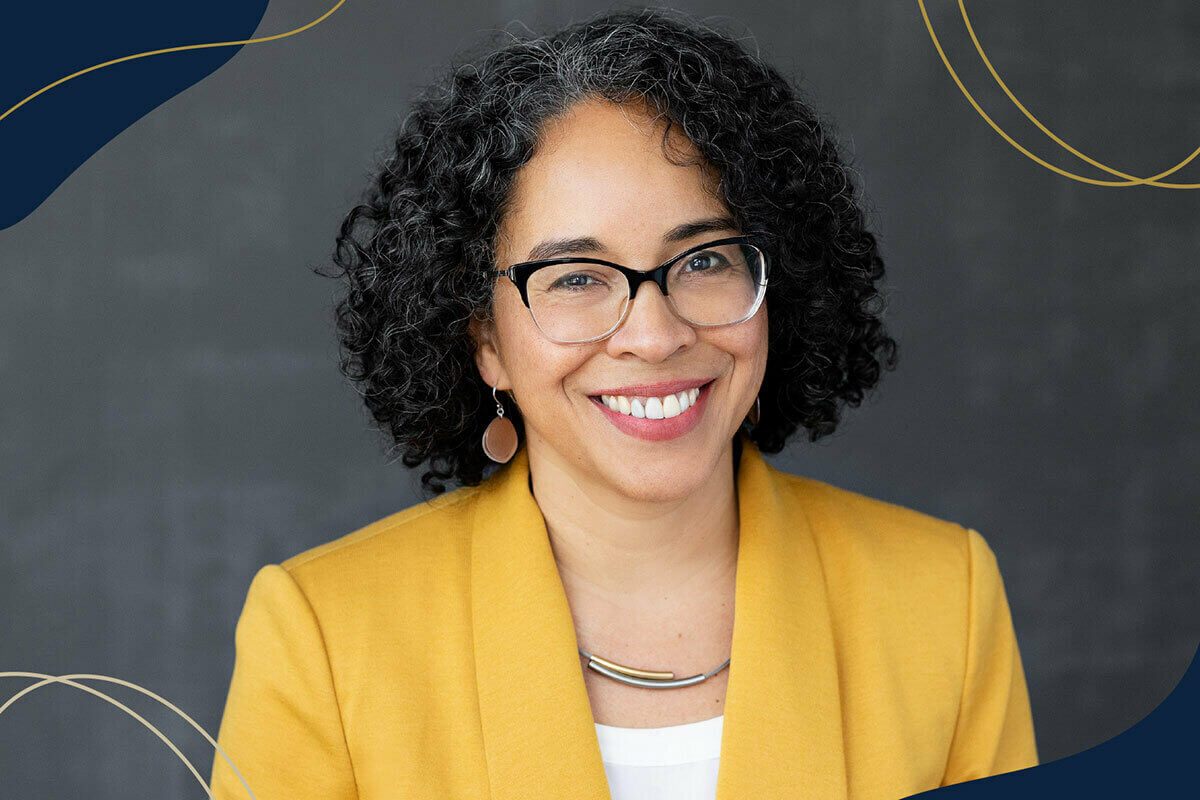

To celebrate the 50th anniversary of the co-education of women at Notre Dame, the College of Arts & Letters is publishing a series of features on alumnae who studied the arts, humanities, or social sciences, then followed a wide range of career paths after graduation. Each profile will detail how a liberal arts education helped these women discern not just what they wanted to do — but who they wanted to be.

Also in this series
• 1980s: Mary Agnes “M.A.” Laguatan, economics and French
• 2010s: Natalie Hibshman, pre-health and psychology
Gina Pérez ’90 still reads a book the same way she was taught to do in her Program of Liberal Studies (PLS) classes. She doesn’t look at the preface, the back cover, or anything else — she just jumps right into the text.
“There’s something of value about coming fresh to something,” Pérez said. “My Arts and Letters education taught me that, and it has made me a lifelong learner. It made me excited about ideas.”
Now a cultural anthropologist and professor of comparative American studies at Oberlin College, Pérez tries to foster that same love of ideas among her students, encouraging them to take fresh looks at topics people have contemplated for centuries.
“The power of an Arts and Letters education is inviting students into conversations that have been going on for a very long time around some of the most enduring questions — justice, love, forgiveness, morality — and creating a space to both recognize that we’re not the first to think about these questions and invite them to write, think, and reflect on them,” Pérez said.
And for Pérez, there’s more to these conversations than just contemplation — she believes they can actually make a difference, something she’s experienced throughout her own life. Driven by her faith, Pérez has spent her post-Notre Dame career engaging with communities both in the U.S. and Latin America through service, activism, and research.
“I believe that ideas and conversations can change the world for the better — because they lead to informed and thoughtful action and engagement with the world,” Pérez said.
‘PLS was the perfect home’
Pérez arrived at Notre Dame intending to study pre-health and theology, but the only thing she knew for certain by the end of her first week was that she wanted to study abroad.
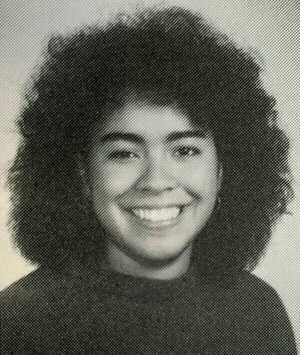
The cancellation of Pérez’s first choice program in Jerusalem led her to spend her sophomore year in Mexico City, an experience that felt both exciting and familiar, as she had grown up speaking Spanish and English in a Puerto Rican family in California.
At the Ibero-Americana University, Pérez took classes about U.S. intervention in Latin American and liberation theology, sparking her interest in minoring in Latin American studies.
“There was a lot going on, so the courses that I was taking helped provide me with the political and economic context for understanding U.S. intervention in Latin America, and so my interest in these topics grew,” Pérez said.
In her second semester in Mexico, however, everything changed. John Ruhlin, a junior PLS major, arrived to live with Pérez’s host family. She admired how Ruhlin thought deeply about ideas, and the two had many long conversations about classes, injustice, and current events.
The more she learned about PLS, the more she felt that it would be the best way to pursue her interests.
“I pictured what I wanted my life to be like when I returned to Notre Dame, and it just seemed that PLS was the perfect home for me,” she said. “The people who seemed to want to think deeply and to question the order of things but who were also involved in trying to make the world and university a better place in concrete ways just so happened to be PLS majors.”
‘The perfect combination of all the things I loved’
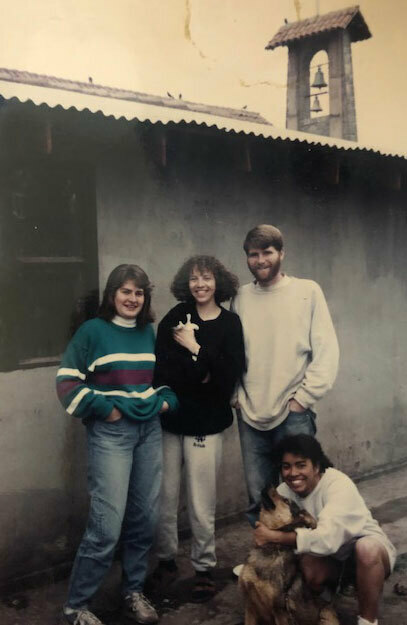
Pérez switched to PLS with just two years left to complete what is typically a four-year program. Her junior and senior years were spent almost entirely in PLS classes, but she still found time to engage in political activism around issues related to Central America.
Her time in Mexico had also solidified her interest in joining the Holy Cross Associates global ministry after graduation. Pérez had learned of a two-year program during her first year at Notre Dame and had immediately felt called to it.
She joined the program and moved to Chile after graduation with three other alumni — David Carey, Liesl Haas, and Jean Lammers — as well as David Morales from Arizona State University. Once in Chile, Pérez, Carey and Haas were sent to the rural town of Pocuro to establish a new Holy Cross community there. Their primary instruction was to accompany the people who lived there — and while they were challenged by that lack of structure, it also freed them to discover and serve the true needs of the community.
Pérez and Haas spent time with women's groups and learned to simply listen to what the women were saying. Many were interested in learning more about democratic participation, so they organized educational presentations and took a group of women, many of whom had never left their community before, to the port city of Valparaíso to visit the congressional building there.
“That’s the thing about putting into practice what you learned in books,” Pérez said. “This idea of accompaniment is very beautiful, but what does it mean to actually accompany someone? It means you have to learn how to knit and how to make bread. You talk about animals, and you go to rodeos. It’s not very glamorous to accompany people in their daily lives, but that’s really the work of revolution and of social justice and of trying to support people and transform their lives in meaningful ways.”

While unaware of it at the time, Pérez had started to develop the anthropological skill of participant observation through her work in Pocuro, but it wasn’t until she decided to apply to graduate school during her second year in Chile that she began to think about that field.
At the guidance of a Holy Cross priest who believed anthropology fit her interests in politics and faith-based organizing, Pérez discovered the curiosity and analytical skills she had developed through PLS perfectly prepared her for a graduate degree in anthropology.
“The great thing about anthropology is that you’re talking to people and spending time with people through participant observation methods,” Pérez said. “It just seemed like the perfect combination of all the things I loved about Notre Dame — thinking and writing about ideas but also engaging with communities.”
“I believe that ideas and conversations can change the world for the better — because they lead to informed and thoughtful action and engagement with the world.”
‘Notre Dame has been the key’
Pérez earned her Ph.D. in anthropology in 2000 at Northwestern University, where her research focused on gentrification and migration as a survival strategy for Puerto Rican families in Humboldt Park, Chicago, and Puerto Rico. She then worked as a researcher at the Center for Puerto Rican Studies at Hunter College in New York City.
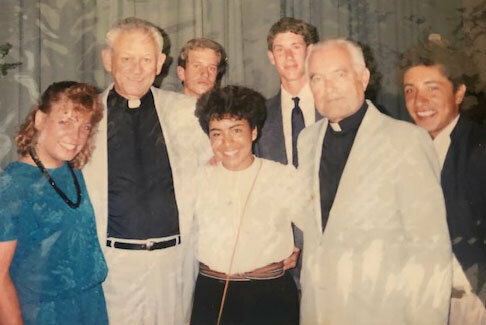
Soon, though, she felt the calling to teach.
“I wanted to have an impact by doing the very thing that changed my life — which is to sit with students and talk about things that could change how they think about the world and how they think about their efficacy in the world,” she said.
Those are lessons she learned both through her experiences at Notre Dame and from her husband and fellow anthropologist, Baron Pineda. In 2003, Pérez and Pineda joined the faculty at Oberlin College, where she continues to teach courses in American studies and Latinx studies that involve community-based learning and research methods and practice.
She’s the author of two books — The Near Northwest Side Story: Gender, Migration and Puerto Rican Families (University of California Press, 2004) and Citizen, Student, Soldier: Latina/o Youth, JROTC and the American Dream (New York University Press, 2015) — and is currently working on a third, which will focus on the sanctuary movement among Latino communities in Ohio during the years of the Trump administration.
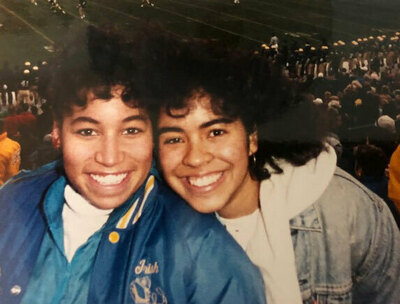
In the classroom, she continues to draw inspiration from her time at Notre Dame — aspiring to be like those who were gracious to her as she strove to complete PLS in two years and who pushed her to be better. She also draws inspiration from her late father, Felix Pérez, who always instilled in her and her siblings the value of education and giving back to others.
“In my teaching, I try to give students critical-thinking tools and writing skills and to get them to read deeply and have conversations,” Pérez said. “Working with 18- to 22-year-olds has definitely been my calling, because they give me hope and remind me of just what a special time my four years were in college.”
Over the years, Pérez has often found her way back to Notre Dame to present her research and to collaborate with faculty. She recently co-edited the book Ethnographic Refusals, Unruly Latinidades (University of New Mexico Press, 2022) with Alex Chávez, the Nancy O’Neill Associate Professor of Anthropology at Notre Dame and a faculty fellow of the Institute for Latino Studies and Initiative on Race and Resilience, that features the work of Latino and Latina anthropologists.
In working with Chávez to develop that book, she said, she sees echoes of conversations, topics, and interests that she had back in South Bend in the 1980s.
“Notre Dame has been the key to what I’ve been able to achieve in my life,” she said. “My whole life has been built on a foundation that was cultivated through my years at Notre Dame as an undergraduate.”
“Notre Dame has been the key to what I’ve been able to achieve in my life. My whole life has been built on a foundation that was cultivated through my years at Notre Dame as an undergraduate.”


